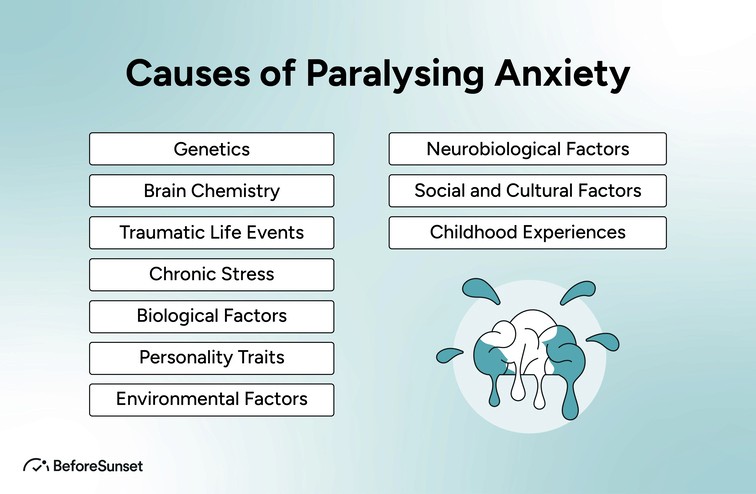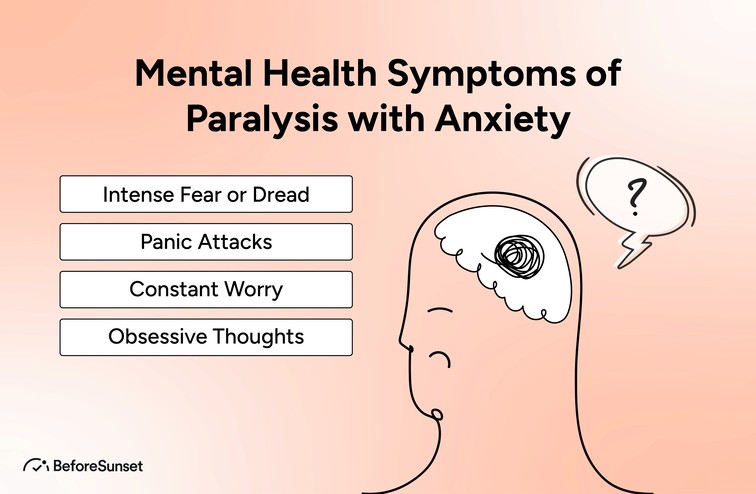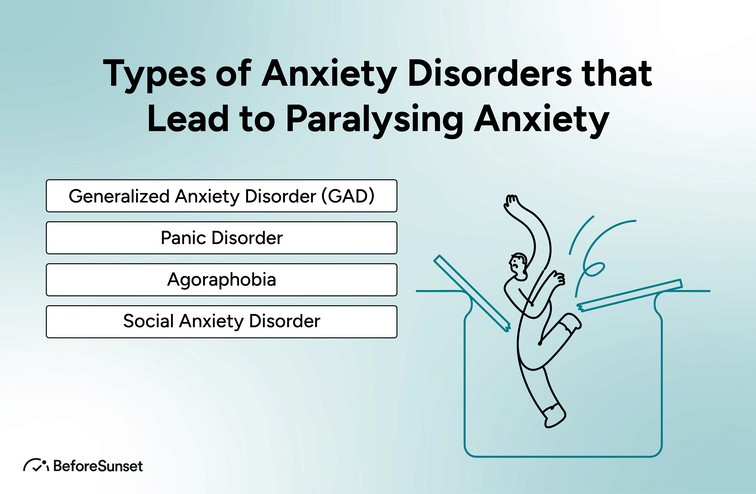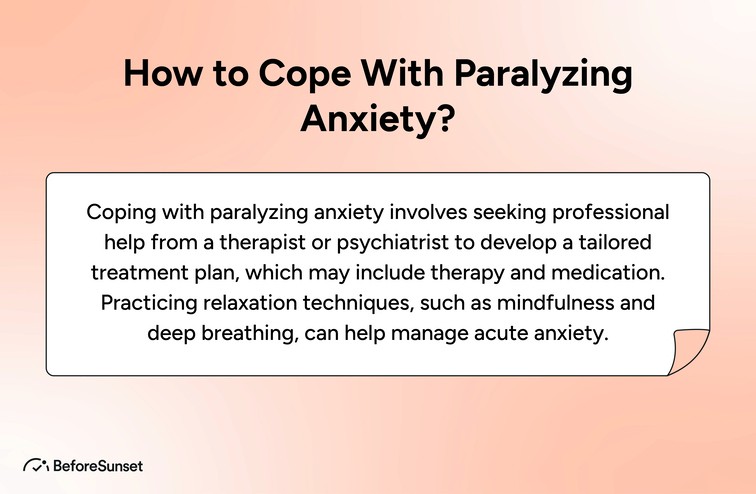Anxiety disorders rank as one of the most common and incapacitating problems that millions of people worldwide deal with on a daily basis in the complex field of mental health.
Among the wide range of anxiety-related feelings, there is one that is very severe and is referred to as "Paralyzed With Anxiety." This gripping mental state engulfs people in a profound abyss of terror, dread, and immobility, temporarily impairing their ability to function in their surroundings.

Causes of Paralysing Anxiety
Genetics: There is evidence to show that an anxiety disorder tendency may run in the family. An increased risk may exist for people with a family history of anxiety or other mental health issues.
Brain Chemistry: Anxiety disorders can be exacerbated by imbalances in brain chemistry, particularly when it comes to neurotransmitters like serotonin and norepinephrine. The body's stress response and the control of mood are both impacted by these abnormalities.
Traumatic Life Events: Going through traumatic or extremely stressful situations, such as being physically or emotionally abused, getting into an accident, experiencing a natural catastrophe, or losing a loved one, might raise the chance of being very anxious. The onset of post-traumatic stress disorder (PTSD) or other anxiety disorders might be attributed to these occurrences.
Chronic Stress: Over time, anxiety disorders can develop as a result of chronic stressors such as continuing work-related stress, financial hardships, or relationship issues.
Biological Factors: Anxiety levels can be influenced by a variety of medical diseases, hormonal changes (such as thyroid problems), and unbalances in the body's stress hormones (such as cortisol).
Personality Traits: Some characteristics, including perfectionism, extreme sensitivity, or a propensity to worry excessively, might make people more vulnerable to anxiety.
Environmental Factors: Anxiety disorders are more likely to develop in those who grow up in stressful or anxious environments. Substance addiction or exposure to environmental pollutants may also be factors.
Neurobiological Factors: Increased anxiety reactions may be caused by abnormalities or dysregulation in the brain's fear circuitry, which includes the amygdala and prefrontal cortex.
Social and Cultural Factors: People who may experience special difficulties because of their identity or heritage may experience stress and anxiety as a result of social pressures, cultural standards, or discrimination.
Childhood Experiences: Early experiences can have an influence on the development of anxiety disorders later in life, such as attachment problems, neglect, or traumatic occurrences.
Physical Symptoms of Paralysis with Anxiety
Muscle Stiffness: When anxiety paralysis strikes, a person may experience a noticeable rise in muscular tension and stiffness, making it difficult for them to move their limbs or body freely. The body's increased level of attention frequently causes this stiffness.
Trembling or Shaking: An episode of anxiety paralysis may be accompanied by trembling or shaking of the limbs, especially the hands and legs. This shaking may be involuntary and be a reaction to stress in the body.
Speaking Difficulties: Anxiety-induced paralysis can also damage the speaking muscles, making it difficult to utter words or create whole phrases. When anxiety is at its highest, a person could find it difficult to talk or might stutter.
Limited Mobility: People who experience a severe anxiety attack may find it difficult to move some body parts or may feel entirely immobilized. The degree of this paralysis might vary, but it is always accompanied by a marked decline in voluntary motor activity.
Slowed Movements: During bouts of anxiety paralysis, movement may become deliberate and sluggish. Standing up, walking, and reaching for objects—simple actions that are usually effortless—can become laborious and time-consuming.
Feeling "Stuck" or "Frozen": Individuals who suffer from anxiety paralysis frequently mention feeling stationary or trapped in time. Even though they may be aware of what has to be done, the intense worry prevents them from taking the essential steps.
Shortness of Breath: Hyperventilation or rapid, shallow breathing can accompany anxiety paralysis. This breathing pattern may worsen the feeling of physical immobility and lead to dizziness.
Chest Pain or Discomfort: Physical symptoms of anxiety, such as pain or discomfort in the chest, can occasionally occur. This can be very upsetting and misdiagnosed as a cardiac condition.
Increased Heart Rate: Anxiety frequently causes palpitations, which might become more noticeable during moments of anxiety paralysis.
Sweating: Another physical sign of anxiety is excessive perspiration, especially in the palms, forehead, or underarms. This symptom can get worse when anxiety is at its worst.

Mental Health Symptoms of Paralysis with Anxiety
Aspects of our well-being that are intricate and multidimensional include our mental health, which includes a wide variety of emotional, cognitive, and psychological experiences. Among the complex web of mental health issues, there is a syndrome known as "Paralysis with Anxiety," which sheds light on the complex interplay between our ideas, emotions, and bodily reactions.
This particular form of anxiety disorder goes beyond the everyday stress and worry that many of us experience. People are thrust into an uncomfortable situation when their bodies and thoughts seem to betray them, briefly paralyzing them with intense worry.
Intense Fear or Dread
A strong and severe emotional reaction known as "intense fear" or "dread" is characterized by an overpowering feeling of dread, horror, or acute uneasiness. It is a powerful emotional experience that can be brought on by a variety of circumstances, occurrences, or even one's own internal feelings and views.
When people feel extreme fear or dread, their bodies frequently react physically, causing symptoms including a heightened level of attention, a faster heartbeat, rapid breathing, sweating, and shaking. The body's "fight or flight" response, an evolutionary mechanism created to enable fast responses to perceived threats or hazards, includes several bodily reactions.
Acrophobia (fear of heights), glossophobia (fear of public speaking), aviophobia (fear of flying), and arachnophobia (fear of spiders) are only a few examples of circumstances or phobias that can cause intense terror or dread. It can also be a sign of some phobias or anxiety disorders like panic disorder or social anxiety disorder.
Panic Attacks
A panic attack is an unprovoked, abrupt, acute experience of paralyzing dread and anxiety. People frequently suffer a fast pulse, shortness of breath, chest discomfort, sweating, shaking, and a variety of painful mental and physical symptoms during a panic attack.
These episodes usually peak within a few minutes, but they may be extremely upsetting and leave people feeling as though their lives are about to end or that they are losing control. Although some circumstances might set off a panic attack, they can also strike apparently out of nowhere, increasing stress and avoidance behaviors.
Although panic episodes by themselves often do not pose a life-threatening hazard, they can be draining on both the body and the mind.
Constant Worry and Obsessive Thoughts
The symptoms of anxiety, including generalized anxiety disorder (GAD), obsessive-compulsive disorder (OCD), and particular phobias, include persistent concern and obsessive thinking. The effects of these symptoms on a person's everyday life and well-being can be profound.
Constant worry, which is frequently linked to GAD, entails excessive and ongoing worries about a variety of things, including one's health, job, relationships, or finances. Even when there is no imminent danger, people with GAD have a tendency to predict the worst and may find it difficult to restrain their worrying.

Types of Anxiety Disorders that Lead to Paralysing Anxiety
A crippling anxiety illness called panic disorder is characterized by unplanned, frequent panic episodes. These episodes are characterized by sharp spikes in anxiety or panic that come on suddenly and intensely.
They are frequently accompanied by a variety of painful physical symptoms including perspiration, a racing heart, shortness of breath, and chest discomfort. People with panic disorder frequently experience persistent anxiety about having another episode, which can result in avoidance behaviors.
This paralyzing dread of panic attacks leads people to restrict their activities and social connections in an effort to avoid these episodes.
Chronic and excessive worry about a variety of issues, such as one's health, income, job, and interpersonal connections, characterizes generalized anxiety disorder. GAD sufferers struggle to restrain their worrying, and their anxiety's protracted nature can be crippling. It can be challenging to focus, make decisions, or just enjoy life when one is in a perpetual sense of discomfort and worry.
A severe fear of being examined or adversely judged by others in social or performance circumstances is the hallmark of social anxiety disorder, also known as social phobia.
This paralyzing anxiety might make a person avoid social situations, public speaking, or any other circumstance where they feel exposed. People who struggle with social anxiety may feel intense anguish, bodily signs like flushing or shaking, and a strong desire to flee or avoid such circumstances.
Irrational and severe phobias of certain things or circumstances, such as heights, flying, animals, or small spaces, are known as specific phobias. Individuals may experience intense anxiety and panic when faced with their phobic triggers, which frequently result in avoidance behaviors.
People may experience a condition of paralysis as a result of their excessive anxiety of coming into contact with certain triggers, which prevents them from taking part in activities they might normally find enjoyable.
Impacts of Paralyzing Anxiety
Impaired Daily Functioning: Paralyzing anxiety can make it very difficult for people to carry out even the most basic daily duties. Going to work or school, shopping, or participating in social gatherings can all become mundane chores that are too difficult to do, which can result in avoidance and isolation.
Relationship Stress: Anxiety can cause relationship stress. People may experience isolation and feelings of loneliness when they are unable to engage in social activities or meaningful conversations because of their anxiety. Friendships, familial ties, and romantic relationships may all suffer as a result of this.
Occupational and Academic Impairment: A person's capacity to succeed in their work or studies may be hampered by paralyzing fear. It could result in recurrent absenteeism, lower productivity, attention problems, and a lack of advancement in one's professional or academic endeavors.
Consequences for Physical Health: Chronic stress brought on by paralyzing anxiety may be harmful to one's physical well-being. Issues including high blood pressure, cardiac difficulties, digestive problems, and a compromised immune system may all be impacted by it.
Mental Health Deterioration: Paralyzing anxiety can worsen mental health conditions already present and can contribute to the emergence of new diseases like depression. The ongoing concern might undermine one's sense of self-worth and self-esteem, aggravating mental suffering.
Financial Impact: When anxiety gets in the way of someone's ability to work or make wise financial decisions, it can lead to financial problems including losing their job, accruing debt, and experiencing financial insecurity.
Avoidance Behavior: To protect themselves from circumstances that can make them anxious, people with paralyzing anxiety frequently engage in avoidance activities. Although it offers short-term respite, avoidance feeds anxiety and can restrict experiences and personal growth.
Substance Abuse: Some people may use alcohol or drugs to relieve their anxiety and self-medicate, which can result in addiction and substance abuse issues.
Loss of Opportunities: Paralyzing worry may keep people from pursuing possibilities for advancement on both a personal and professional level, limiting their potential and level of happiness in life.
Isolation and Loneliness: People who isolate themselves and stop participating in social activities because of anxiety may also feel quite lonely, which can make them feel even more distressed emotionally.

How to Cope With Paralyzing Anxiety?
Consultation with a mental health specialist is the first step in overcoming paralyzing anxiety. A therapist or psychiatrist can provide a precise diagnosis, evaluate how severe your anxiety is, and create a unique treatment plan for you. Therapy is incredibly successful at treating the underlying reasons for anxiety and imparting coping mechanisms, particularly cognitive-behavioral therapy (CBT).
A psychiatrist may occasionally recommend medication to treat the symptoms of extreme anxiety. It is simpler to enter treatment and use coping mechanisms when anxiety and panic symptoms are reduced by beta-blockers, antidepressants, or other prescription drugs.
Learning and using relaxation methods like progressive muscle relaxation, mindfulness meditation, or deep breathing exercises can help lessen the physical signs of worry. These techniques can be applied in times of extreme anxiety and induce a sense of serenity.
Make a crisis plan in collaboration with your mental health professional. Specific coping mechanisms to use during severe anxiety or panic attacks should be included in this plan, along with emergency contact details for help.
Consider progressive exposure treatment if your anxiety is exacerbated by avoidance tactics. You can gradually face fearful circumstances or triggers under the direction of a therapist. This desensitization procedure might lessen your anxiety reaction over time.
Work carefully with your therapist to pinpoint the precise triggers that result in crippling anxiety. You may create specialized techniques for handling those triggers by developing an understanding of the underlying reasons for your anxiety.
Make self-care activities a priority in your everyday routine. This includes keeping up a healthy weight, exercising often, and getting adequate restorative sleep. These elements have a big impact on your general well-being and stress tolerance.
Navigating Paralysis Anxiety in Daily Life
Paralysis anxiety, often sparked by analysis paralysis or an overwhelming fear of failure, is a common experience in both professional life and daily life. It arises from persistent anxiety triggers that disrupt our ability to complete everyday tasks and can result in muscle tension, heightened fear responses, and difficulty managing daily tasks.
During times of stress, these feelings of fear may increase, leaving people stuck and unable to move forward.
Recognizing these anxiety symptoms and the underlying level of anxiety they bring is essential for a better quality of life. To cope, many find grounding exercises, mindfulness exercises, and physical movement to be valuable tools for managing anxiety. Practicing deep breathing, incorporating regular exercise, and having a plan of action are all helpful strategies.
These treatment options can ease the paralysis felt from time to time and bring relief to a core part of the human experience—the drive to live well and effectively manage our routines.
Stop Paralyzing Anxiety With BeforeSunset AI
Does planning your day stress you out? Are you paralyzed by your anxiety? Have no fear BeforeSunset AI is here. The AI function plans your day for you, all you have to do is focus on finishing your tasks. Try it today!


